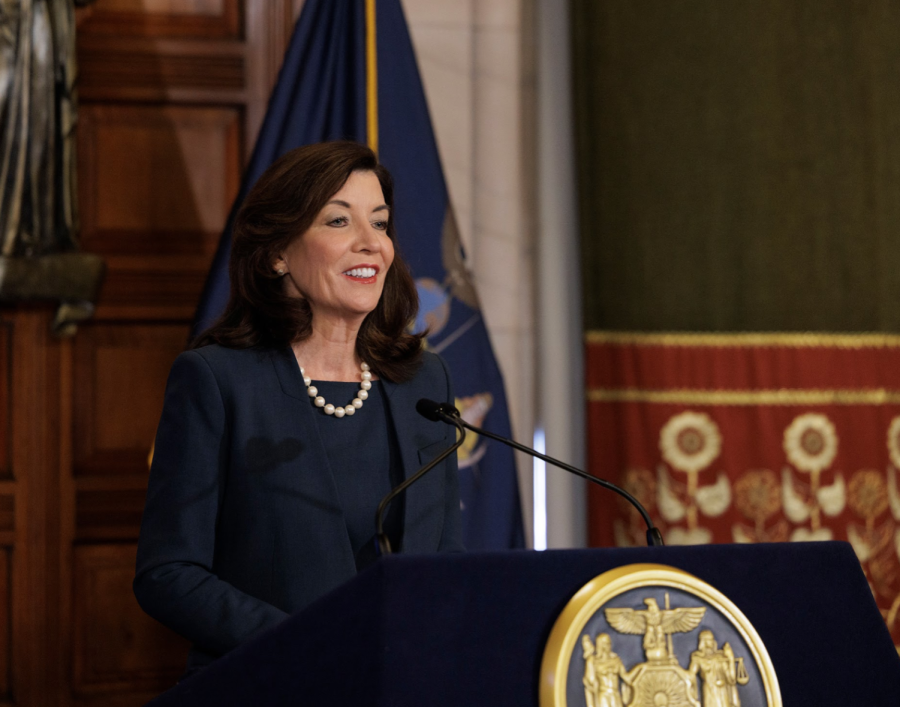CUNY receives $1.2 billion increase for FY 2023
April 29, 2022
New York Gov. Kathy Hochul and the state legislature passed a $220 billion state budget that included a $1.2 billion increase in funding for CUNY for the fiscal year 2023.
The budget allocations for CUNY included increased funds to hire new full-time faculty, cover operating costs, improve academic programs and services, complete capital projects, increase programs and expand childcare services on campuses.
“The opportunity to pursue a quality education is the silver bullet for so many New Yorkers,” Gov. Hochul said. “With this budget we are going to unleash the power of higher education to lift up the people of our state by investing in our institutions and our teachers.”
Within the $1.2 billion budget increase, $500 million will be provided to CUNY as operating support.
“This transformational increase includes money for both systems and greater supports for students across the State,” the governor’s website said.
The budget will provide CUNY with $53 million to hire additional full-time faculty at both four-year colleges and community colleges. There is also a $110 million increase to fund fringe benefits for SUNY and CUNY staff.
“This investment will fund additional full-time faculty— at SUNY and CUNY, including support for CUNY’s plan to convert adjuncts to full-time faculty,” the governor’s website said.
$40 million of the budget will be used to improve academic programs, increase enrollment, enhance student support services and modernize operations. For capital projects, $879 million was allocated for CUNY’s senior colleges and $102 million for community colleges in the state.
Additionally, the budget will provide support to protect community colleges from the loss of over $80 million in funding caused by declining enrollment.
The Part-time Tuition Assistance Program also received an additional $150 million to support part-time students in degree-seeking programs and non-degree training programs at community colleges.
There was a $30 million increase in funding for higher education opportunity programs and training centers, “to ensure those students who face academic and economic challenges are positioned for success,” according to the governor’s website. One of these programs is CUNY’s Search for Education, Elevation and Knowledge — also known as SEEK — program.
CUNY and SUNY will also receive $15.6 million to establish childcare centers. Currently, 17 out of 25 CUNY colleges offer on-campus childcare services.
“We thank Governor Hochul for her leadership in setting the tone with a first executive budget that she described as a ‘once-in-a-generation opportunity to invest in our future,’” CUNY Chancellor Felix Matos Rodríguez said about the budget increase in a statement.
“In proposing record funding increases for CUNY, the Governor’s executive budget recognized the University’s historical mission of providing high-quality, affordable education to New Yorkers of all backgrounds and means, and the central role CUNY and its colleges play in the health and economic success of New York,” he said.
Even though the budget increase has received many positive reactions, some also noted that the current improvements should be a steppingstone instead of an end goal.
“While some details remain uncertain, it’s clear this budget demonstrates a renewed understanding and appreciation of CUNY’s ability to uplift our communities, build futures, and power New York State’s economy,” CUNY Professional Staff Congress, the union for all CUNY faculty and staff, said in a statement. “It sets us on a course to a New Deal for CUNY, which we must follow for the sake of future generations of CUNY students.”
The New Deal for CUNY is a state bill supported by PSC, CUNY Rising Alliance and some city and state legislators that would eliminate in-state tuition for students, raise salaries for adjunct professors and lecturers, fix broken infrastructure across the university’s campuses, set minimum professor to student ratios for classrooms and increase the number of mental health counselors.
“Public institutions such as CUNY that support working people and communities of color have been chronically underfunded for too long; undoing that damage will require more transformative investment,” the PSC statement continued. “CUNY will receive the largest year-over-year increase in decades, but the senior colleges will still be left next year with per-student funding below 2009 levels.”
New York Senate Majority Leader Andrea Stewart-Cousins, Assembly Speaker Carl Heastie, Senate Higher Education Chair Toby Ann Stavisky and Assembly Higher Education Chair Deborah Glick were among those who supported the budget increase.









Vivian Valdmanis, Ph.D. • Mar 10, 2023 at 11:14 am
Maybe without an overbloated, overpaid, nepotistic environment, CUNY would be more solvent.